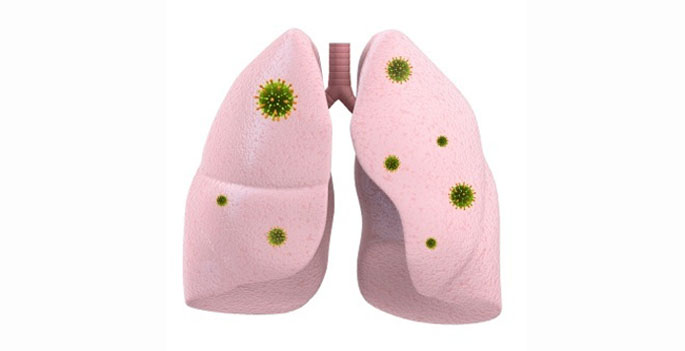RSV
-

Study finds RSV may evade vaccines via rapid mutation
A Vanderbilt study concluded that RSV’s ability to mutate rapidly to escape detection by the body’s immune system makes it more challenging to design and develop vaccines that can stop it from spreading. Read MoreMar 9, 2023
-

RSV transmission in the Middle East
Understanding how RSV is transmitted, which strains dominate and how new strains emerge around the globe will guide better vaccine and anti-viral drug design. Read MoreNov 14, 2019
-

Team explores diabetes drug’s ability to treat RSV infection
A drug used to treat diabetes, liraglutide, may point to new therapies for respiratory syncytial virus (RSV) bronchiolitis — inflammation and obstruction of the lungs’ small airways. Read MoreJul 12, 2018
-

Study sheds light on how childhood RSV can lead to asthma
Infants who have higher amounts of the bacterium Lactobacillus present in their nose or upper part of the throat during an acute respiratory syncytial virus (RSV) infection are less likely to develop childhood wheezing later in life, a new Vanderbilt-led Center for Asthma Research study found. Read MoreMar 1, 2018
-

Hope for an RSV vaccine
Newly discovered features in an RSV protein may be useful for rational structure-based vaccine design. Read MoreFeb 23, 2018
-

RSV-HRV viral interference
RSV infection reduces the risk of infection with human rhinovirus, which could have implications for vaccine development and prevention strategies for viral respiratory tract infections in infants. Read MoreMay 15, 2017
-

Team isolates new antibodies that may aid RSV vaccine design
Researchers at Vanderbilt University Medical Center (VUMC) have taken another step toward developing a vaccine against respiratory syncytial virus (RSV), the major cause of life-threatening pneumonia in infants worldwide. Read MoreFeb 9, 2017
-

Research sheds light on how RSV wards off potential vaccines
Respiratory syncytial virus (RSV) is the major cause of life-threatening viral pneumonia in infants worldwide, yet despite repeated efforts, scientists have been unable to develop an effective vaccine against it. Read MoreOct 20, 2016
-

Team to study RSV’s role in asthma formation
Investigators in the Division of Allergy, Pulmonary and Critical Care Medicine recently received a $4.5 million Asthma and Allergic Diseases Cooperative Research Center (AADCRC) grant from the National Institutes of Allergy and Infectious Diseases (NIAID). Read MoreJul 21, 2016
-

Gene variant, environment can boost RSV severity
A particular genetic mutation combined with an urban environment increases the risk of severe disease in children infected with respiratory syncytial virus (RSV), an international team of investigators has found. Read MoreApr 2, 2015
-

Respiratory viruses are main childhood pneumonia culprit: Study
Respiratory viruses, not bacterial infections, are the most commonly detected causes of community-acquired pneumonia in children, according to new research released Feb. 26 in the New England Journal of Medicine. Read MoreFeb 26, 2015
-

Study identifies antibody that may fight MPV, RSV
New Vanderbilt-led research published in the Journal of Infectious Diseases has identified an antibody that shows promise in preventing and treating human metapneumovirus (MPV) and respiratory syncytial virus (RSV) — the two leading causes of respiratory infections in young children. Read MoreJul 17, 2014
-

Discovery may pave way for RSV vaccine
Vanderbilt University scientists have contributed to a major finding, reported this week in the journal Nature, which could lead to the first effective vaccine against respiratory syncytial virus (RSV), a significant cause of infant mortality. Read MoreFeb 5, 2014
-

VU researchers ‘goldsmith’ new RSV vaccine approach
Vanderbilt vaccine researchers are using gold nanotechnology to develop a new approach to making vaccines. Read MoreJul 18, 2013
-

Study finds maternal diet may predict RSV severity
An important predictor of the severity of respiratory syncytial virus (RSV) in infants may be what their mothers ate during pregnancy. Read MoreMar 4, 2013
-

Cell entry ports for cold virus
The respiratory virus HMPV uses its fusion (F) protein – which interacts with cellular receptors called integrins – to bind to and enter target cells. Read MoreSep 25, 2012
-

New therapeutic target for cold, flu viruses identified
Viruses that cause acute respiratory infections — such as human metapneumovirus (HMPV) and flu — impair a set of immune system cells that should clear the virus from the lungs. Now, Vanderbilt University investigators have discovered the signaling pathway that disables these immune cells. Read MoreAug 9, 2012
-

On the tail of RSV infection mechanism
New details about the life cycle of respiratory syncytial virus (RSV) could aid the development of therapies to combat this leading cause of serious illness in infants and the elderly. Read MoreFeb 15, 2012
-

Aliquots – VUMC research highlights
RSV prefers stressed cells “Stress granules” – globs of proteins and RNAs – form inside cells in response to environmental stressors and are thought to regulate protein production. Several viruses induce stress granule formation, but the function of these structures during virus replication is not well understood. James Crowe Jr.,… Read MoreJan 6, 2011